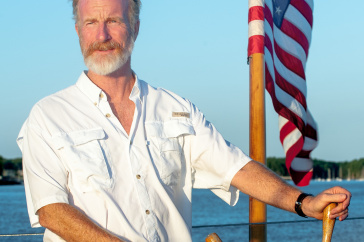UNH Professor Pens Book on History of Fishing the Atlantic

W. Jeffrey Bolster, an associate professor of history at the University of New Hampshire and professional seafarer, has written the new book, "The Mortal Sea: Fishing the Atlantic in the Age of Sail". Credit: UNH Photographic Services.
Since the Viking ascendancy in the Middle Ages, the Atlantic has shaped the lives of people who depended upon it for survival. And just as surely, people have shaped the Atlantic. In his innovative account of this interdependency,W. Jeffrey Bolster, a historian at the University of New Hampshire, takes us through a millennium-long environmental history of our impact on one of the largest ecosystems in the world.
The UNH associate professor's new book, "The Mortal Sea: Fishing the Atlantic in the Age of Sail," is available today, Oct. 8, 2012 (The Belknap Press of Harvard University Press).
While overfishing is often thought of as a contemporary problem, Bolster reveals that humans were transforming the sea long before factory trawlers turned fishing from a handliner's art into an industrial enterprise. The western Atlantic's legendary fishing banks, stretching from Cape Cod to Newfoundland, have attracted fishermen for more than 500 years.
Bolster follows the effects of this siren's song from its medieval European origins to the advent of industrialized fishing in American waters at the beginning of the 20th century.
"Beginning the story well before industrialization emphasizes the longevity of people's short-sighted impact on the ocean, and emphasizes, as well, how modern technology was not necessary to affect the balance of nature," Bolster says.
"With its deep roots, this tale is probably the longest history possible of Euro-Americans' interaction with any aspect of their natural environment, a story of unrealistic hopes, frequent articulated concerns, destruction, and denial," he says.
Blending marine biology, ecological insight, and a remarkable cast of characters, from notable explorers to scientists to an army of unknown fishermen, Bolster tells a story that is both ecological and human: the prelude to an environmental disaster. Over generations, harvesters created a quiet catastrophe as the sea could no longer renew itself.
Bolster writes in the hope that the intimate relationship humans have long had with the ocean, and the species that live within it, can be restored for future generations.
"Today's fishermen are descendants of the oldest continually operated business enterprise in the New World, one predicated on renewable resources, and one with a centuries-old history of conversations about conservation. Yet today both fisherman and fish are in crisis," Bolster says.
Formerly a professional seafarer, Bolster started fishing as a child with his father in Connecticut's Norwalk Islands and got his first boat at age 12. He spent a decade fishing and captaining vessels from tall ships and charter boats to oceanographic research vessels out of Woods Hole. He recalls one summer day in the 1970s jigging on Brown's Bank in Plymouth, Mass. "until we were knee-deep in cod, arms numb from landing fish on three-pound stainless-steel jigs that were lethal, even without bait, in the mysterious crosscurrents below."
"Back then, before I understood the plight of the living oceans - or knew that thoughtful fishermen from generations past had realized they were hitting it too hard - I enthusiastically long-lined swordfish on the northeast peak of Georges Bank, east of Cape Cod," Bolster says.
"Sometimes I think I know too much now about the changes in the sea to fish anymore," he adds, "but the question really is one of scale. How many fish should one catch?"
The University of New Hampshire, founded in 1866, is a world-class public research university with the feel of a New England liberal arts college. A land, sea, and space-grant university, UNH is the state's flagship public institution, enrolling 12,200 undergraduate and 2,300 graduate students.
-30-
Latest News
-
July 2, 2024
-
June 18, 2024
-
June 18, 2024
-
May 17, 2024
-
May 14, 2024

















































